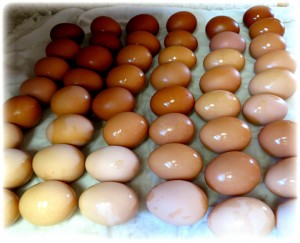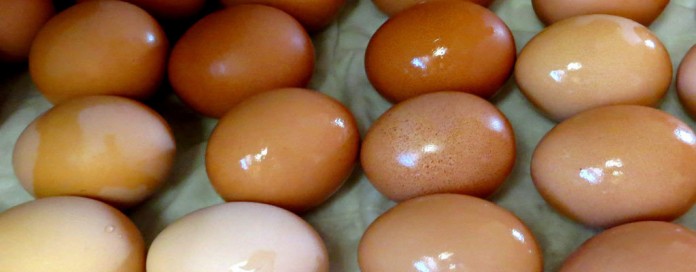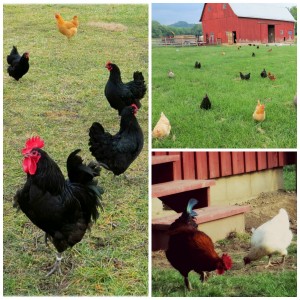Spring came suddenly in southern Ohio. Rain and warmer temperatures quickly melted snow from the last winter storm. My flock of free range laying hens is delighted to feast on green sprouts and bugs again. The first week of March their egg production quadrupled.
There are several reasons chickens lay more eggs in spring:
Light. Chickens lay best when exposed to at least 14 hours of light a day. From October to February, there is not enough natural light to meet that requirement. Egg production declines unless birds are supplemented with artificial light. March means more daylight and, subsequently, more eggs.
Temperature. Egg production drops noticeably in December, when the daily temperatures are consistently below 40 degrees Fahrenheit. The reverse happens in March when temperatures are consistently above 40 degrees.
Life cycle. Hens begin to lay eggs at age 20-25 weeks. They reach peak production when they are 1 year old and steadily decline thereafter. I’ve noticed egg production decreases in half by the time my birds reach 3 years of age.
Molt. Molt is a natural part of the chicken life cycle. Each year chickens lose some feathers and temporarily stop laying eggs. Molt can last a couple of months.
Diet. Providing birds with nutritionally balanced feed, grit and plenty of fresh water optimizes egg production. If layers’ diet is missing important vitamins and minerals or if they are not getting enough to drink, they will have decreased egg production or poorly developed eggs.
Stress. Moving chickens to a new location or disrupting their pecking order causes stress that decreases egg production. Predators are another cause of stress in birds. I had the unfortunate experience of discovering a huge snake in my coop that had been stressing my birds and eating their eggs. Rats, skunks and coons are other predators to beware of.
How to keep eggs fresh
Collect eggs every day. Extension literature recommends washing eggs in warm water and a mild detergent, allowing five minutes to air dry and then placing eggs in the refrigerator pointed side down. Suggested shelf life is 3-5 weeks.

Hard-boiling
Hard-boiling is a quick and convenient way to enjoy eggs. Hardboiled eggs are good for seven days in shell, five days once peeled.
- Place eggs in a stockpot, cover with water and bring to boil.
- Once boiling, turn off heat. Allow to sit 10 minutes on the stove. Drain water.
- Refrigerate eggs 24 hours for easy peeling the next day.
Pickling eggs
Pickling preserves eggs in vinegar. Pickled eggs are delicious on salads, sandwiches or as a protein-packed snack.
Ingredients
- 12 eggs
- 2 cans (15 ounces each) whole beets
- 1 cup sugar
- 1 cup water
- 1 cup cider vinegar
Directions
- Hard-boil eggs. Peel after 24 hours.
- Drain beets, reserve juice.
- Place beets and eggs in a large glass jar.
- In a small saucepan, boil sugar, water, vinegar and beet juice. Remove from heat to cool slightly.
- Pour liquid over beets and eggs. Cool completely.
- Cover tightly and refrigerate at least 24 hours before serving.













Thanks for writing an interesting article. About the recipe…. once it is made, how long will pickled eggs & beets keep in the refrigerator? Last year I did pickle fresh beets (cooked) using a similar recipe. I froze them in freezer zip lock bags. Months later, I defrosted them for dinner, and they were as crisp as the day I processed them. I was happy that they did not turn to mush.
As a general rule, unopened home canned foods have a shelf life of 1-2 years. Although I doubt your pickled eggs will last that long before somebody eats them all ;)
I understand the canned shelf life. What about just refrigerating the pickled beets…what would be their shelf life? Thanks so much for the info.
Refrigerating pickled eggs, pickled anything actually, prolongs it’s shelf life. But the older the Pickled Eggs get, the more rubbery they get. For best flavor I’d recommend eating refrigerated pickled eggs within 2-3 months.